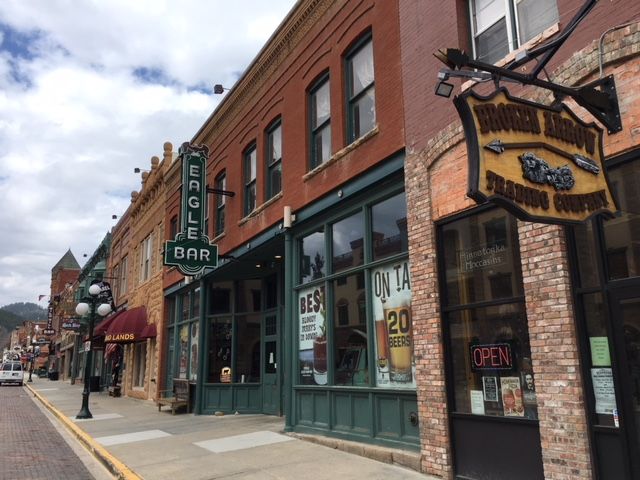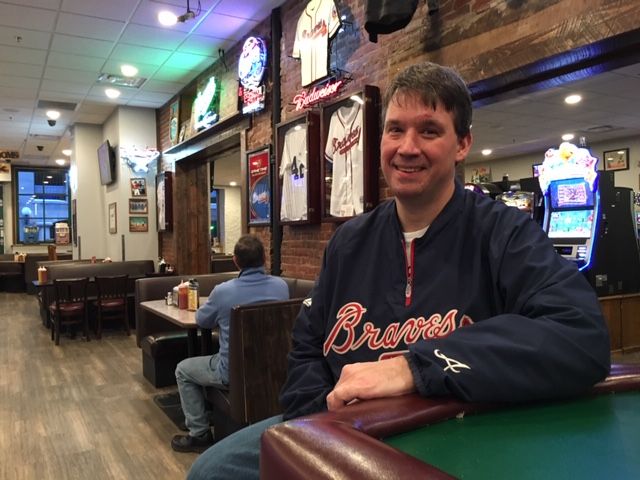Next month, the South Dakota Legislature will be asked to pave the way for legalized sports betting in the state.
Proponents pushing a constitutional amendment to allow the gaming in Deadwood casinos want lawmakers to place the question on the 2020 ballot.
Several states now offer sports betting and others are considering it following a U.S. Supreme Court ruling in May. The decision struck down a federal law which banned such betting outside of Nevada. The ruling allows individual states to determine if sports betting will be allowed.
Gaming industry professionals, sports bar owners, even those charged with overseeing South Dakota’s current legalized wagering, acknowledge that illegal sports betting is already occurring in the state. Proponents of legal sports betting contend that South Dakota is missing out on potential revenues in the process.
“I was sitting at the bar at the Ramkota in Pierre and the guy next to me picked up his phone and made a bet on a football game,” said Larry Eliason, executive secretary of the South Dakota Commission on Gaming, the state agency that oversees all legal gambling activities in the state. “Of course, he didn’t know who I was.
“So, we know people in South Dakota bet on sports through bookies now,” Eliason added.
“How much they bet and how many bookies there are, we don’t know. It’s difficult to accurately gauge the extent of any activity that’s illegal.”
South Dakota has had legal gaming since 1989 and 22 casinos are operating in Deadwood. Gaming is only legal in Deadwood and at tribal casinos, though the video lottery is legal across the state.
The proposed amendment would expand the definition of gaming allowed in Deadwood casinos. If approved, the constitutional change also would allow sports betting in tribal casinos.
As proposed, the measure also would return a bigger share of gambling tax revenue to the city of Deadwood. The city has received $6.8 million in revenue each year since gambling was legalized in the state in 1989. The proposed amendment would allow the Deadwood allocation to grow with inflation.

Sports betting is big business in US
An official with the American Gaming Association, which represents a $261 billion casino gaming industry in the U.S., told a U.S. House subcommittee in September that a massive illegal sports betting market currently exceeds $150 billion each year.
“This vast illegal market has fueled criminal activity and left American consumers outside of Nevada with no safe alternative to bet,” AGA Senior Vice President Sara Slane told the House panel. “Nearly 60 percent of Americans were in favor of eliminating the failed federal ban, and nearly two-thirds of Americans believe legal, regulated sports betting would deliver benefits to their communities.”
Since the Supreme Court’s May ruling, 18 states have considered legislation to legalize sports betting and Delaware, New Jersey, Mississippi and West Virginia have joined Nevada in allowing single-game sports betting. Meanwhile, operations in Pennsylvania, Rhode Island and New York are pending, Slane said.
Several other states, including Iowa, Nebraska and New Mexico, are currently exploring legislation to allow sports betting, according to recent news reports.
In view of what’s happening across the country, South Dakota’s gaming industry experts contend that sanctioning legal wagering on sporting contests will permit Deadwood and the state’s tribal casinos to remain competitive with other gaming jurisdictions – the same argument used when craps, roulette and keno were added to the state’s stable of games in summer 2015.
The Deadwood Gaming Association, which led past efforts to increase bet limits and add roulette, craps and keno to the existing slate of poker, blackjack and slot machines, has discussed what it needs to do to make legal sports betting come to South Dakota.
“For Deadwood, legal sports betting creates additional opportunities, particularly as it relates to high-visibility contests like the Super Bowl, Sweet 16, Major League Baseball World Series and the college football playoffs,” said Mike Rodman, executive director of the DGA. “All of those could create excitement, additional marketing opportunities, and would bring people to town. We know the people in South Dakota like sports betting and would like to do it in a legal, safe and regulated manner.”
In addition to giving prospective visitors another reason to come to Deadwood, Rodman noted that bringing legal sports wagering to Deadwood and the state’s tribal casinos would result in additional tax revenues for the state.
“We believe for Deadwood, a $100 million annual gaming market, that we would realize $1 million to $2 million in annual sports betting,” he said.
At least one of South Dakota’s tribes currently operating a casino supports the DGA plan.
“Sports betting is a multi-billion-dollar industry that, until recently, was illegal in most United States jurisdictions,” said Seth Pearman, an attorney representing the Flandreau Santee Sioux Tribe. “We have been actively monitoring the legalization of wagering on sporting events.”
Pearman said the tribe has had conversations with the Deadwood Gaming Association, industry experts and others regarding the possibility of legalizing in South Dakota and intends to work with these partners to further the legalization efforts.
“Sports wagering at the Royal River Casino would diversify the gaming opportunities for patrons, would positively impact their experience overall, and would keep them from leaving the area to legally place wagers,” Pearman said.
“People in South Dakota right now can get on their computer and sports bet, and people have their local bookies, betting on weekly baseball and football. The state is starved for revenues. If the people want to accept it, let’s go for it and make a few dollars off of it and get some revenues for education or the counties." - Rep. Tim Rounds
Deadwood gaming today
The state assesses a 9 percent tax on Deadwood gaming revenues. In addition, a $2,000 per device/table fee is paid by the casinos. From those revenues, 1 percent goes directly to the state general fund, 40 percent to South Dakota Department of Tourism, 10 percent to Lawrence County, and the rest to the South Dakota Gaming Association until its expenses are met.
State law caps the city of Deadwood’s “take” from legalized gambling at $6.8 million annually. After that cap is met, any of the excess funds are distributed to Lawrence County cities and school districts.
Deadwood has spent the money on bond payments for city projects, historic preservation activities, building repair and maintenance, marketing and a variety of other projects.
Last year, after all financial obligations under the law were met, excess funds totaling nearly $2 million were deposited in the general fund, $279,000 was distributed to other municipalities, and $279,000 went to the school districts, according to Gaming Commission reports.
With sports betting, Rodman said, the goal would be to massage the $2,000 fee per device into a set fee that would cover each sports betting location, rather than each window.

Changing the Constitution
The process of changing the state’s constitution to allow sports betting could take nearly three years.
The proposed language amending the state constitution, has been reviewed by the state Legislative Research Council and by the state Attorney General’s office. It is expected to be presented to the state Legislature when it convenes in January, with the hope that it would approve placement of the constitutional amendment on the fall 2020 ballot.
If the Legislature declines to place the amendment on the ballot, proponents would be required to obtain as many as 35,000 signatures of registered South Dakota voters on petitions to put the measure before voters in November 2020.
“It’s a long process,” Rodman said. “If all of the hurdles are met, the earliest South Dakotans could make a legal sports wager in the state would be July 1, 2021.”
Tim Rounds, a Republican legislator who has served 14 years in the State House representing Hughes, Hyde, Stanley and Sully counties, said he would likely favor a measure in the next legislative session to bring the issue to voters.
“People in South Dakota right now can get on their computer and sports bet, and people have their local bookies, betting on weekly baseball and football,” he said. “The state is starved for revenues. If the people want to accept it, let’s go for it and make a few dollars off of it and get some revenues for education or the counties. I would like South Dakotans to be allowed to decide the issue.”
Rep. Tim Johns, who served 30 years as a magistrate and circuit court judge before being elected to represent Northern Black Hills residents in the state House, has previously championed legislation that authorized increases in bet limits and the addition of craps, roulette and keno. When asked if he would sponsor legislation tied to legalizing sports betting in the next legislative session, Johns was noncommittal.
“Frankly, I’m sure sports betting is already here and is probably in every bar in the small towns of South Dakota,” Johns said. “There is something to say about legalizing it and taxing it. We’re always looking for additional revenues and if it’s going to happen, it needs to be regulated.”
But, Johns also said that he is still studying the issue.
“I haven’t made up my mind and I haven’t taken a position,” he said. “I know there will be considerable opposition to it from certain segments – those who oppose any form of gambling. But, I’m willing to look at it.”
Although the Rapid City-based Family Heritage Alliance has not taken a formal stand on legalizing sports wagering, Executive Director Norman Woods said his organization would likely oppose any effort to expand gambling opportunities.
“In general, we’ve traditionally been opposed to expanded gambling in the state,” Woods said. “On sports betting in particular, we haven’t taken a stance yet. We usually wait until actual legislation is proposed before the Legislature.”
In the past, Woods noted that the Family Heritage Alliance had opposed increased bet limits and the addition of craps, roulette and keno due to the “secondary negative affects of gambling,” which include addiction, stress on families, and increased rates of embezzlement, crime and suicide.
If proponents of sports wagering are successful and South Dakota voters gamble on bringing the newest form of betting to the state, the Legislature and the South Dakota Commission on Gaming, “would need to convene and establish new rules and regulations and address all of the details and nuances,” said the Gaming Commission’s Eliason.
“They also would establish the tax rate and whether they could bet on collegiate contests and would that include whether they could bet on South Dakota teams,” Eliason said. For instance, in New Jersey gamblers may place wagers on college games, but not on New Jersey schools, while Mississippi has no such restriction, he said.
While Eliason plans to retire in early 2019, he said his agency would examine what rules other states have adopted in determining what’s right for South Dakota.
“Of course, we’d also look at Nevada due to its experience in this arena,” he said. The Legislature would be charged with determining where revenues derived from sports betting would be dedicated, he said.

Bar owners anticipate increased activity
Walk into Mustang Sally’s sports bar on Deadwood’s Main Street any evening or weekend and you’ll find 25 flat-screen televisions airing virtually every sporting contest around the globe, from European soccer matches to NFL and MLB contests.
Owner Toby Keehn says anybody interested in placing an illegal sports bet today can do so with relative ease. While he said he’s familiar with a few bookies primarily operating East River, Keehn said the South Dakota Commission on Gaming acts as a deterrent for those activities in the western portion of South Dakota.
“Anybody who wants to bet on a game can probably figure it out,” he said. “You can place a bet now and have a better payback on your phone than in Las Vegas.”
Regardless, depending on the level of taxes the state imposes on legal sports betting, Keehn believes it would provide another entertainment option for Deadwood visitors that might just bring a few more customers through the door.
“I think it would be a wonderful addition to our gaming options because it’s truly entertainment,” he said. “If it was legal, all of a sudden the consumer has protections and oversight and I don’t think it would be hard to set up. It could be kiosks or an established sports book. With today’s technology, I wouldn’t be surprised if, when it’s all said and done, somebody could walk up to a video lottery machine and make a bet.”
Deadwood Mayor Dave Ruth agreed with Keehn’s assessment, and stressed that his Northern Hills tourist town needs to compete on a par with its competitors across the nation.
“Recent reports on the handle in Deadwood indicate a stabilization of the gaming industry,” Ruth said. “Without being able to offer the same betting opportunities as other venues, we will once again be behind our competitors in the industry. It’s important that we be able to not only keep up, but potentially lead the industry because if you’re going backwards, you’re shrinking.”
Ruth said he anticipated his community would be working with the Deadwood Gaming Association and its allies to get sports betting approved statewide.
“Gaming is an important part of our local economy and anything we can do to promote and grow our industry, we have a responsibility to pursue,” the mayor said.




